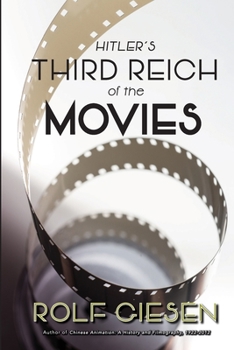Hitler's Third Reich of the Movies and the Aftermath
"We're here to stay " was what Nazi Propaganda Minister Joseph Goebbels assured, speaking to members of the German film industry in early 1933.
There were many who agreed with him like Karl Ritter who introduced Mickey Mouse to German audiences in 1930 and in 1933 began to produce propaganda films like Hitler Youth Quex "In our cinemas we want to see nothing else than convinced National Socialists "
For a while German film export languished, but with WW2 the Nazis "conquered" cinemas all over Europe and flooded them with their movies, propaganda as well as allegedly "apolitical" entertainment. In the new Germany one can laugh again the propaganda promised but it was a different way of laughing. It was gallows humor.
This book deals not only with Hitler's personal cinematic likes and dislikes, with the ambitions of Leni Riefenstahl, with the idyllic world of German animation, with film emigration, with anti-Semitic films, Dachau and Auschwitz. There is also a back story to tell about certain German silents like Metropolis and why the way of Teutonic imagery didn't end with the death of the Nazi leaders in 1945, why their way of "laughing" is still alive on German screens...
From the Foreword:
It is also a story about family entertainment in Nazi times, about animated films that were supposed to fulfill the Nazis' dream of creating a cartoon film industry that would rival Disney and make Europe's children happy, while the little captives of a children's barrack in Auschwitz who dreamed of Disney's Snow White, too, thanks to murals painted by a Jewish artist, ended in burning fiery furnaces.
About the author
Rolf Giesen, a film historian, worked for 40 years writing, collecting, supervising, lecturing in Germany and abroad, particularly China. He is one of Europe's leading experts on animation and VFX.





